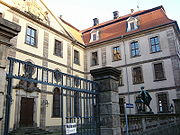
University of Fulda
Encyclopedia

Adolphus von Dalberg
Adolphus von Dalberg was a German Benedictine Prince-Abbot of Fulda Abbey and founder of the former university in the same city — University of Fulda.-Biography:...
and existed until 1805. Most of the students and professors were Catholic. Under Prince-Bishop Heinrich von Bibra
Heinrich von Bibra
Heinrich von Bibra , Prince-Bishop, Prince-Abbot of Fulda was Prince-Bishop from 1759 to 1788.-Biography:...
Protestants were also admitted; from 1777, with the sole exception of the theological faculty, a Protestant could acquire a degree in any faculty of the university.
During 71 years of its existence the university had about 4100 students. 935 of them came from the town of Fulda
Fulda
Fulda is a city in Hesse, Germany; it is located on the river Fulda and is the administrative seat of the Fulda district .- Early Middle Ages :...
and approximately 400 from the area of the later circles Fulda. Most of foreign students came from France, Nassau and Westphalia or from the enclaves in Hessen and Thuringia.
At the beginning the university had four faculties: Theology, philosophy, medicine and law. In the beginning the chairs of the theology faculty have been taken by Jesuits
Society of Jesus
The Society of Jesus is a Catholic male religious order that follows the teachings of the Catholic Church. The members are called Jesuits, and are also known colloquially as "God's Army" and as "The Company," these being references to founder Ignatius of Loyola's military background and a...
– up to abolition of the Jesuit Order in Fulda in 1773 – as well as by Benedictine
Benedictine
Benedictine refers to the spirituality and consecrated life in accordance with the Rule of St Benedict, written by Benedict of Nursia in the sixth century for the cenobitic communities he founded in central Italy. The most notable of these is Monte Cassino, the first monastery founded by Benedict...
s. After the suppression of the Jesuit Order by Pope Clement XIV
Pope Clement XIV
Pope Clement XIV , born Giovanni Vincenzo Antonio Ganganelli, was Pope from 1769 to 1774. At the time of his election, he was the only Franciscan friar in the College of Cardinals.-Early life:...
in 1773 the university came entirely into the hands of the Benedictines, who were finally obliged to discontinue it in 1805, in consequence of the Napoleonic secularization
Secularization
Secularization is the transformation of a society from close identification with religious values and institutions toward non-religious values and secular institutions...
of Fulda Abbey in 1802.
The baroque building was constructed from 1731 to 1734 according to the plans of the court architect Andreas Gallasini. The assembly hall of the old university was served in 1803-1902 as a Protestant church, today can be used for festive arrangements.
The university was closed in 1805 by the sovereign of the secularized Fulda, William I of the Netherlands
William I of the Netherlands
William I Frederick, born Willem Frederik Prins van Oranje-Nassau , was a Prince of Orange and the first King of the Netherlands and Grand Duke of Luxembourg....
.
Notable alumni
- Amand von Buseck (1685-1756), Director of University of Fulda (1736)
- Anselm Erb (1688-1767), Prof. Dr. jur. can.
- Heinrich von BibraHeinrich von BibraHeinrich von Bibra , Prince-Bishop, Prince-Abbot of Fulda was Prince-Bishop from 1759 to 1788.-Biography:...
(1711-1788), - Karl von Piesport (1716-1800), Prof. Dr. theol., Theologian and Philosopher, Benedictine
- Sturmius Bruns (1749-1779), Prof. Dr. theol., Professor Orientalist (1773), Professor and Doctor of Theology (1774)
- Siegmund von Bibra (1750-1803), Theologian
- Benedikt Balthasar Herrlein (1750-1809), Prof. Dr. phil., Catholic Priest
- Johann von Reibelt (* 1752), Dr. theol.
- Friedrich MünterFriedrich MünterFriedrich Christian Carl Heinrich Münter was a German-Danish scholar, professor of theology at the University of Copenhagen, orientalist, church historian, archaeologist, Danish bishop of Zealand, and freemason...
(1761-1830), Prof. Dr. theol., Theologian, Philolog and Bishop - Ferdinand August von SpiegelFerdinand August von SpiegelCount Ferdinand August von Spiegel zum Desenberg und Canstein, was Archbishop of Cologne from 1824 until 1835.- Literature :...
(1764-1835)
See also
- Fulda University of Applied SciencesFulda University of Applied SciencesFulda University of Applied Sciences , former known as Fachhochschule Fulda, was founded as the fifth state Fachhochschule in Hesse in 1974.- History :...
- List of early modern universities in Europe

